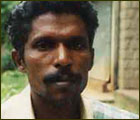 |
|
|
|
|
STORY : Engineering Crops in a Needy World By John Biewen
In Europe and the United States, the debate over genetically modified (GM) crops has focused on questions about the environment and food safety. But in developing countries, the questions are different and the stakes are higher. For farm families just barely surviving, the possibility that GM crops could make things better—or worse—is a question of life or death.
India has emerged as a leading hotspot in the worldwide battle over
GM crops. The nation is home to one-fourth of the world's poorest people.
Most poor Indians are farmers. Whether those farmers should start planting
genetically modified seeds is the subject of an impassioned argument among
Indian politicians, scientists, and activists. But the people who will
be most affected by the outcome—farmers themselves—are rarely
heard.
Venkat Reddy saw only two terrible choices: to commit suicide, or sell a
piece of his body.
Reddy is 38—a small man and very thin. He used to grow cotton and chilies on four acres of rented land in the South Indian state of Andhra Pradesh.
"To clear the loans," Reddy says through an interpreter, "I thought it was better to donate something rather than kill myself and leave my family. So when the broker came, I agreed to actually sell my kidney rather than, you know, kill myself with insecticide."
Hundreds of destitute Indian farmers have committed suicide in recent years. Farm groups say Reddy is one of ten men in his part of Andhra Pradesh who've sold kidneys.
Reddy pulls up his shirt to reveal the scar where the surgeon cut him open. The thousand dollars allowed Reddy to erase his debts, but the surgery left him too weak to work. Now his wife supports him and their three children by doing labor on neighboring farms. NEXT>> |
|||||||||||||||||||||
 But a year ago he bought worthless seeds from a dishonest salesman. His crop failed. To survive, he borrowed from a moneylender, but with no cotton crop to sell he couldn't make the payments. He was trapped. Every year Indian farmers in similar straits commit suicide by the hundreds. Reddy says he thought about that option. Then a man came through the village looking for desperate farmers in need of cash. The man was offering a deal: a thousand dollars for a kidney.
But a year ago he bought worthless seeds from a dishonest salesman. His crop failed. To survive, he borrowed from a moneylender, but with no cotton crop to sell he couldn't make the payments. He was trapped. Every year Indian farmers in similar straits commit suicide by the hundreds. Reddy says he thought about that option. Then a man came through the village looking for desperate farmers in need of cash. The man was offering a deal: a thousand dollars for a kidney.